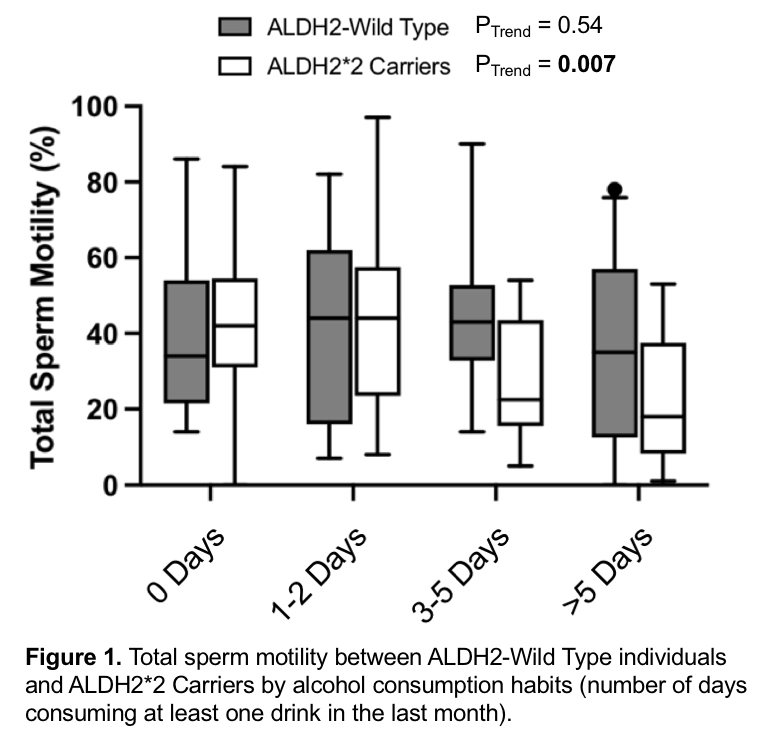Back
Poster, Podium & Video Sessions
Podium
PD20: Infertility: Epidemiology & Evaluation II
PD20-03: ALDH2 Expression, Alcohol Intake, and Semen Parameters Among East Asian Men
Saturday, May 14, 2022
7:20 AM – 7:30 AM
Location: Room 244
Daniel R. Greenberg*, Chicago, IL, Hriday P. Bhambhvani, Satvir S. Basran, Brett P. Salazar, Sin-Jin Li, Che-Hong Chen, Daria Mochly-Rosen, Michael L. Eisenberg, Stanford, CA
- DG
Podium Presenter(s)
Introduction: Mutations in acetaldehyde dehydrogenase-2 (ALDH2) are highly prevalent in the global population. The most common variant, ALDH2*2, is present in 40-50% of East Asian individuals. This mutation causes acetaldehyde accumulation, flushing, and tachycardia after alcohol intake. While alcohol consumption is common, the relationship between alcohol intake and ALDH2 genotype on semen parameters remains unknown. We aimed to determine if ALDH2 genotype and alcohol consumption are associated with differences in semen parameters and ALDH2 expression in East Asian men.
Methods: East Asian men completed a survey and submitted a semen sample for analysis. Participants were genotyped to determine ALDH2 status (wild type vs ALDH2*2 carrier) and immunohistochemical staining was used to determine overall protein expression of ALDH2 in spermatozoa. Demographics, alcohol consumption habits, and sexual habits were also collected. Student’s t test was used to determine differences in demographics, semen parameters, and ALDH2 expression between and among ALDH2 genotypes.
Results: 45 (40.2%) of 112 men were ALDH2*2 carriers. There was no difference in alcohol consumption or sexual habits between ALDH2 genotypes. Among ALDH2*2 carriers, alcohol consumption was associated with significantly lower total sperm motility (25.6 ± 16.8% vs 45.2 ± 25.8%, p=0.005) and progressive sperm motility (23.0 ± 15.1% vs 39.0 ± 21.7%, p=0.008). Among alcohol consumers, ALDH2*2 men had significantly lower total sperm motility (25.5 ± 16.8 vs 39.2 ± 23.1%, p=0.021), progressive sperm motility (23.0 ± 15.1% vs 34.9 ± 20.1%, p=0.022) and total motile sperm count (44.7 ± 48.5M vs 101.2 ± 119.9M, p=0.047) compared to wild-type individuals (Figure 1). Secondly, ALDH2 protein expression in spermatozoa was significantly lower in ALDH2*2 carriers (p < 0.001).
Conclusions: Alcohol consumption among ALDH2*2 carriers is associated with significantly lower total sperm motility, progressive sperm motility, and total motile sperm count. ALDH2*2 individuals also have significantly decreased protein expression of ALDH2 in spermatozoa. These findings suggest genotyping ALDH2, coupled with alcohol cessation counseling, may improve semen parameters among East Asian men.
Source of Funding: None.

Methods: East Asian men completed a survey and submitted a semen sample for analysis. Participants were genotyped to determine ALDH2 status (wild type vs ALDH2*2 carrier) and immunohistochemical staining was used to determine overall protein expression of ALDH2 in spermatozoa. Demographics, alcohol consumption habits, and sexual habits were also collected. Student’s t test was used to determine differences in demographics, semen parameters, and ALDH2 expression between and among ALDH2 genotypes.
Results: 45 (40.2%) of 112 men were ALDH2*2 carriers. There was no difference in alcohol consumption or sexual habits between ALDH2 genotypes. Among ALDH2*2 carriers, alcohol consumption was associated with significantly lower total sperm motility (25.6 ± 16.8% vs 45.2 ± 25.8%, p=0.005) and progressive sperm motility (23.0 ± 15.1% vs 39.0 ± 21.7%, p=0.008). Among alcohol consumers, ALDH2*2 men had significantly lower total sperm motility (25.5 ± 16.8 vs 39.2 ± 23.1%, p=0.021), progressive sperm motility (23.0 ± 15.1% vs 34.9 ± 20.1%, p=0.022) and total motile sperm count (44.7 ± 48.5M vs 101.2 ± 119.9M, p=0.047) compared to wild-type individuals (Figure 1). Secondly, ALDH2 protein expression in spermatozoa was significantly lower in ALDH2*2 carriers (p < 0.001).
Conclusions: Alcohol consumption among ALDH2*2 carriers is associated with significantly lower total sperm motility, progressive sperm motility, and total motile sperm count. ALDH2*2 individuals also have significantly decreased protein expression of ALDH2 in spermatozoa. These findings suggest genotyping ALDH2, coupled with alcohol cessation counseling, may improve semen parameters among East Asian men.
Source of Funding: None.


.jpg)
.jpg)